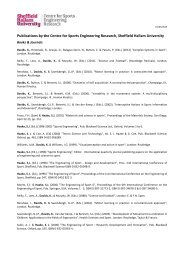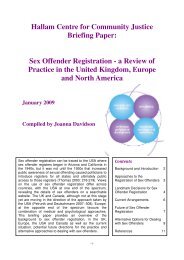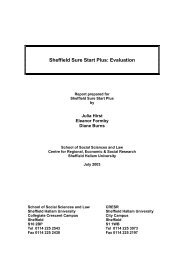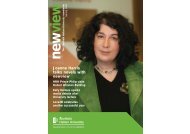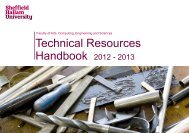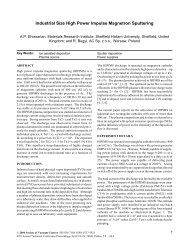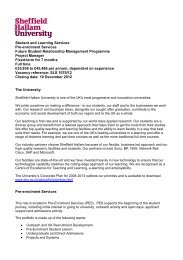The exercise of judicial discretion in rent arrears cases - Sheffield ...
The exercise of judicial discretion in rent arrears cases - Sheffield ...
The exercise of judicial discretion in rent arrears cases - Sheffield ...
You also want an ePaper? Increase the reach of your titles
YUMPU automatically turns print PDFs into web optimized ePapers that Google loves.
some unevenness <strong>in</strong> the impact <strong>of</strong> relationships <strong>of</strong> trust which suggests that the identity <strong>of</strong><br />
the district judge might be important. Some judges <strong>in</strong> our observation sample always<br />
granted the order requested, whilst there was a more even distribution for others.<br />
F<strong>in</strong>ally, trust might also be said to impact on consistency <strong>of</strong> decision-mak<strong>in</strong>g. In our focus<br />
groups, both claimants and defendants were particularly concerned about the issue <strong>of</strong><br />
consistency between district judges and between courts. We have already discussed<br />
whether <strong>in</strong>dividual judges respond diffe<strong>rent</strong>ly to requests made by claimants. However, trust<br />
might have a geographical basis; that is, <strong>in</strong> certa<strong>in</strong> courts, there might be a higher degree <strong>of</strong><br />
trust which might impact on the question <strong>of</strong> consistency, thus affect<strong>in</strong>g the outcome <strong>of</strong> <strong>cases</strong>.<br />
This has been discussed <strong>in</strong> Chapter 4, above, where the difference between the outcomes<br />
requested and granted were shown to vary between courts.<br />
Factors affect<strong>in</strong>g trust<br />
In explor<strong>in</strong>g the relationships <strong>of</strong> trust which develop there is a number <strong>of</strong> factors that emerge<br />
as important:<br />
<strong>The</strong> nature <strong>of</strong> representation<br />
“Tra<strong>in</strong><strong>in</strong>g” claimants<br />
Longevity<br />
Trust and confidence<br />
Hierarchies <strong>of</strong> trust<br />
<strong>The</strong> ‘social’ aspects <strong>of</strong> landlords<br />
<strong>The</strong> nature <strong>of</strong> representation<br />
Most representatives who now appear <strong>in</strong> hous<strong>in</strong>g possession <strong>cases</strong> are hous<strong>in</strong>g <strong>of</strong>ficers,<br />
and not lawyers (see p. 14 as to the greater use <strong>of</strong> <strong>of</strong>ficers <strong>in</strong> court by hous<strong>in</strong>g<br />
organisations). A small number <strong>of</strong> district judges <strong>in</strong> our sample regretted this shift, for<br />
example because employees <strong>of</strong> the claimant might not be able to see the “whole picture”<br />
(DJ A). However, for most, the use <strong>of</strong> hous<strong>in</strong>g <strong>of</strong>ficers was a positive feature. <strong>The</strong>re was a<br />
number <strong>of</strong> reasons for view<strong>in</strong>g this shift as positive, one district judge say<strong>in</strong>g that he would<br />
rather hear the “organ gr<strong>in</strong>der” (DJ C), and many regarded use <strong>of</strong> counsel as a waste <strong>of</strong><br />
money. Counsel were said to feel that they had to plough through all the facts <strong>of</strong> the case,<br />
prov<strong>in</strong>g every po<strong>in</strong>t, which was regarded as a waste <strong>of</strong> time <strong>in</strong> lengthy court lists.<br />
By contrast, there were many benefits <strong>of</strong> hous<strong>in</strong>g <strong>of</strong>ficers act<strong>in</strong>g as representatives. For<br />
example, good hous<strong>in</strong>g <strong>of</strong>ficers knew their tenants and were able to answer questions about<br />
46



